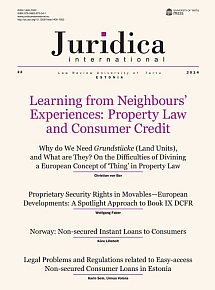The Way to Over-indebtedness—Intensive Marketing, Easy Access to Loans, and Insufficient Legislation (Denmark)
DOI:
https://doi.org/10.12697/JI.2014.22.08Keywords:
consumer credit, instant loans, maximum cost, over-indebtedness, responsible lending, SMS loans, usuryAbstract
Consumer credit is increasingly offered, for various purposes and in various ways. In particular, electronic Web and SMS loans have been growing considerably over the last few years, and they attract attention owing to their high costs. The easy access to credit, in combination with intensive marketing, contributes to increased private borrowing, thus creating a debtor culture. The fact that easy access to credit is not purely to the benefit of the consumer is reflected in the main register for default on private debt in Denmark. Here more than one in 20 adult Danes are registered with a bad credit history, and the defaulted debt has doubled in the last six years. The focus of the article, therefore, is on the legal problems related to easy access to non-secured consumer credit as illustrated by Danish legislation. It is suggested that the legislation is not functioning effectively and that more well-proportioned solutions are needed. A modern approach should recognise that consumer credit differs from other consumer arrangements, in that consumers run a special risk of becoming over-indebted – not only to their own detriment but ultimately also to that of society. One of the possible solutions is to limit marketing and introduce responsible lending standards.


